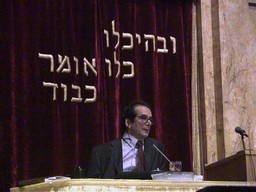New | Contact | Site Map
East-Side Apartment
Rozenblit-Vieira Wedding
Reunion Fortnight
Parades, Parades
Performing Arts
Public Affairs Lectures
Family Roots
Spiritual Encounters
Middle East
Eastern Europe
Bulgaria
Romania
Ukraine
Poland
Prague
Home
Lectures
Bernard Lewis
We have long been interested in the Middle East, both for its history, its culture, and its current political problems. And of course it is the birthplace of our good friend Moshe and the home of another friend, Paloma.
Not surprisingly therefore, we were delighted to learn that the famous British historian Bernard Lewis would be speaking at a large Jewish synagogue in New York on the historical links between Islam and Judaism. We hadn't had the pleasure of reading any of Mr. Lewis's books, but we did know that they were big best-sellers and had thumbed through them in bookstores.
We made sure to arrive early at the hall, expecting that there would be a sell-out crowd. We were certainly right about that as the large auditorium was full to capacity. But we were wrong about the quality of the talk. For about three quarters of an hour, Professor Lewis gave a very high-level overview of Moslem-Jewish-Christian relations which taught us nothing new and provided no insights into the modern problems of the region. Perhaps it was too much to expect, but that didn't lessen our disappointment.
Charles Krauthammer

|
We learned about another talk at another upper east side temple by reading the noticeboard outside of the synagogue. The synagogue was called Kehilath Jeshurun and it was the speaker rather than the topic that attracted us to what we later learned was a memorial lecture to honor the first anniversary of the death of a prominent member of the synagogue.
The speaker was Charles Krauthammer, a well-known conservative columnist and rather a favorite of ours. Our first surprise was to learn that he has some kind of illness, probably multiple sclerosis, that keeps him confined to a wheelchair and unable to lift a glass to take a drink — a straw solves that problem. But his mind is not at all impaired and he gave a very interesting talk about the Israeli-Palestinian Oslo peace accords and why in his opinion they had been a mistake for Israel.
His thesis was that the accords had fooled Israel into believing that peace could be negotiated, convinced them to put weapons into the hands of their enemies, and produced the current intifada. He also spoke witheringly about the unilateral Israeli withdrawal from southern Lebanon as a clear signal to the Hezbollah and Hamas that with time, the Jews will do the same in Israel, withdraw and give the extremists what they want. We hope he is wrong.
Japan Society
In late November, our friends Roberta and Joe Nacmias invited us to an interesting talk given at the Japan Society by young Americans who had been given scholarships to visit Japan. They recounted their experiences and contrasted life in Tokyo with life in New York City. There were no great insights, but it was a pleasant evening that included to Jan's delight snacks of sushi afterwards. Thanks Joe and Roberta for a lovely evening.
Baruch College
Our friend Roberta also gave us the heads-up about a talk at Baruch College about the current economic crisis in Japan. Sponsored by Mitsui USA it was held at the Weissman Center for International Business. It was a sign of things to come for us as we got a very nice lunch for attending the talk, just as we were to do frequently in Washington D.C.
Rockefeller University
The title of the talk was: How the Rest of the World Sees the U.S. The speaker was Gareth Evans, CEO of the International Crisis Group and the former Foreign Minister of Australia Mr Evans' main thrust was that the U.S. was seen around the world as a gorilla with a big stick and instead of spending so much on the military should be spending more on aid like its European allies.
Jan wrote the following notes after listening to the lecture: What is wrong with one doing the cooking and one doing the washing up? Why shouldn’t the U.S. with her military strength be the big gorilla with the big stick and let the Europeans and our other allies use their self-proclaimed diplomatic skills on the gentle persuasion front? To mix metaphors, why shouldn’t we all play bad cop good cop to the world’s delinquents and miscreants?
We now know that it is not only Saddam Hussein who can only be brought to reason by confronting him with a big gorilla with a big stick. The same appears to be true of the United Nations Security Council. Without the threat of unilateral action before them, who can doubt that the wimps of the council would have ducked the issue of disarmament yet again? With respect to Mr. Evans’s complaint about the low level of foreign aid given by the U.S., I wonder why the extra money we spend on the military cannot be counted as a kind of foreign aid. Certainly without it, the world would be less peaceful. Also is the money spent on the Peace Corps included in the foreign aid column?